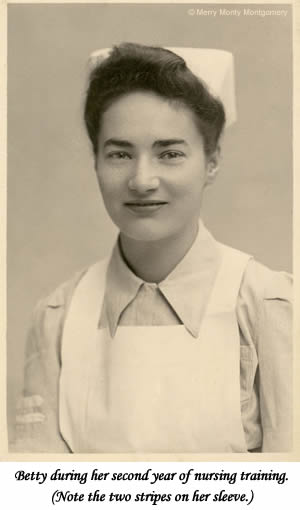Betty Pauline Clark (1920-2005) was my maternal aunt who worked as a nurse. She began her nurse’s training in February 1944 and was completely devoted to her job, until she was forced to retire through ill health in 1978. The main parts of her career involved working at the Star and Garter Hospital in Richmond where she looked after geriatric WW1 ex-servicemen, a T.B. hospital in Oxfordshire and a geriatric hospital near Ringwood in Hampshire. For the majority of this time she was a ward sister. In 1946, during her second year of nurses’ training, she witnessed an important development in medical history, and the following is her account of the incident:-
“It was the end of 1946 and I was about two and a half years into my three year initial nurse’s training. I had been at Salisbury Infirmary for the whole of this time and had enjoyed it all immensely, despite being worked very hard by the more senior nursing staff.
On this particular day we were not feeling very cheerful. A few days previously a young man had been admitted following a motorcycle accident. His injuries were quite serious, but it was hoped that after an operation to one of his legs he would pull through. At first things had gone well and he had survived the operation. Some of the other nurses had got into trouble for chatting to this young man, as we were told staff and in particular, students, must not fraternize with the patients.

At the start of my duty we were informed that the young man was now seriously ill with septicaemia (blood poisoning). We were not told he would die, but we all knew that this was the likely outcome, and we were all very saddened by this news. In those days the main method of fighting this type of infection was the use of sulphonamide drugs which could be successful, but were often very damaging to the kidneys and had not worked in other cases of blood poisoning I had come across during my time at the hospital.
Very soon after I had begun my shift one of the senior consultants appeared on the ward. This was earlier than he usually arrived for his ward round and Sister looked a little startled to see him as we were not yet prepared; all patients who were well enough had to be sitting up with plumped pillows and not a sheet or blanket out of place when any doctor made his rounds, or there was hell to pay – not from the doctors, but from Sister!
The consultant looked quite distracted and there was a distinct feeling of tension in the air. I wondered what was going on and, as we hid in the sluice, asked one of my fellow student friends if she knew? We were not allowed to talk to each other whilst on duty unless it was concerning a patient and gossip would not be tolerated under any circumstances, so we were forced to whisper. My friend told me that she had heard that they wanted to try a new drug on the young man who was so ill. I later discovered this drug had been sent to us from London by St Mary’s Hospital in Paddington, and that it had not been used at Salisbury Infirmary before.
A few minutes later the doctor was at the young man’s bedside, along with an entourage of other staff. As I passed by I heard Sister’s voice, “Nurse, here, this moment”. Realising I was the nearest person I glanced across and Sister beckoned me to her side. “Hold this patient’s arm, please Nurse”. So I held the forearm of the young man whilst the doctor administered an injection. There was a heavy silence as he completed his task and I was dismissed immediately.
During all this time the patient had been unconscious and apparently unaware of what he had undergone. I expect during the rest of that day he was given further injections, but I was not aware of this as I continued with my duties around the ward. At the end of my shift I left the ward with two of my fellow students. “I wonder if that young man will survive?”, asked one of them. I shrugged and asked her if she knew what drug he had been given, but she didn’t know.
The following day I entered the ward on an early shift. I looked to the bed where the young man had been treated the previous day, but it was empty. I sighed to myself, but couldn’t waste too much time thinking about one patient as I had a lot of tasks to complete. However, at lunchtime I met up with some of my friends who were students on other wards in the hospital. One gave me some good news, “We have your famous patient!”. I asked her what she meant and she told me, “The man who had the motorcycle accident and who was given the penicillin, he’s half recovered already! He came to us because you needed the space on your ward”.
So, without even knowing it at the time, I had witnessed the very first dose of penicillin being given at Salisbury Infirmary. I never saw the young man again, but often think about him. I wonder if he realised how lucky he was?”
Merry Monty Montgomery
© Merry Monty Montgomery 2009
Sources
Betty’s memoirs
Personal photograph album